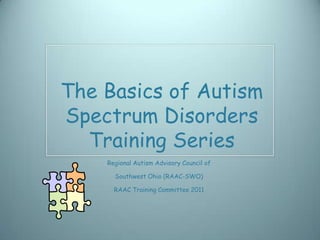
School training module two,physical characteristics of autis
- 1. The Basics of Autism Spectrum Disorders Training Series Regional Autism Advisory Council of Southwest Ohio (RAAC-SWO) RAAC Training Committee 2011
- 2. Training Series Modules Module One: Autism Defined, Autism Prevalence and Primary Characteristics Module Two: Physical Characteristics of Autism Module Three: Cognition and Learning in Autism Module Four: Getting the Student Ready to Learn Module Five: Structuring the Classroom Environment Module Six: Using Reinforcement in the Classroom
- 3. Training Series Modules Module Seven: Autism and Sensory Differences Module Eight: Sensory in the Classroom Module Nine: Communication and Autism Module Ten: Communication in the Classroom Module Eleven: Behavior Challenges and Autism Module Twelve: Understanding Behavior in Students with Autism
- 4. Training Series Modules Module Thirteen: Social Skills in the School Environment Module Fourteen: Functional Behavior Assessment Module Fifteen: Working Together as a Team Module Sixteen: Autism and Leisure Skills to Teach Module Seventeen: Special Issues of Adolescence Module Eighteen: Safety and Autism Module Nineteen: Special Issues: High School, Transition, and Job Readiness
- 5. Training Series Modules Module Twenty: Asperger Syndrome: Managing and Organizing the Environment Module Twenty-One: Asperger Syndrome: Addressing Social Skills
- 6. The next few slides will introduce some of the physical challenges of students with ASD
- 7. Pain Differences Even if the student can talk, they may not be able to tell you when they are sick or in pain. The student may not seem to notice cuts or bruises or other injuries. The student may seem to be only slightly uncomfortable even with major injuries. The student seems slightly ill even with a serious illness.
- 8. Possible Signs of Pain The student may have new behaviors that are different or unusual. They may be quieter than usual or may be very still. They may try to hurt or hit themselves. They may try to hurt someone else.
- 9. Stomach or Digestion Problems It is believed that up to 70% of all people with ASD have some type of stomach or digestion problems. Some people may have reflux or heartburn. Some people may have problems with constipation. Some people may have problems with frequent diarrhea.
- 10. Stomach or Digestion Problems If the student has stomach or digestion problems they may have behaviors because they are uncomfortable. They may not be able to tell you when their stomach hurts. Sometimes the one way to tell that the student has stomach pain is if they are bent over or have difficulty standing up straight when they are walking.
- 11. Eating Problems Some students with ASD are very picky eaters. Some reasons for being picky are because they don’t like the way the food feels in their mouth. because the smell of the food may bother them. because they don’t like the sound the food makes when they chew it. because they have reflux and that makes them not want to eat.
- 12. Eating Problems Continued Some students with ASD seem to be always hungry. They may seem to be hungry because they don’t feel full even if they have eaten a lot of food. Some students may be hungry because of a medicine they are taking. Some individuals eat because they don’t have a lot of other things to do with their time.
- 13. Eating Problems Continued Some children eat things that are not food. This is called pica. This is a very dangerous behavior. The things they eat are things that we might think would taste awful. We don’t understand why they eat these things. Usually an expert is needed to work on this behavior. We need to watch the student carefully to keep them from eating these items.
- 14. Sleep Problems Some children with autism have a hard time sleeping. Some have a hard time falling asleep. Some wake up during the night. Some have severe sleep apnea that causes them to have a hard time breathing.
- 15. Sleep Problems Continued If they are awake at night, they may wander around. This can be dangerous. If they do not sleep at night, they may fall asleep during the day. They may be grouchy during the day because they are tired.
- 16. Ideas to Help with Sleep Problems Some ideas for team members to discuss together with family if sleeping behavior is a concern: Talk about a regular bedtime routine. Suggest activities before bedtime are calming activities. Recommend to families to report sleep problems to their doctor because it may be a sign of illness. Discuss the sleep environment which may affect the way their child is sleeping (i.e. noise, light, temperature, bed clothing, etc.)
- 17. Seizures Some children with ASD have seizures. Some students with ASD may not develop seizures until they are teenagers. If a child has seizures and is on medicine to stop seizures, it is important that they always take their medication. If a seizure lasts for more five minutes you need to call 911.
- 18. Big Idea If a person with ASD acts as if they don't feel well, pay very close attention. Any sudden, dramatic change in behavior should be considered a possible sign of pain or illness.
Notes de l'éditeur
- You-tube medical issues for Autistic people.
- Children pictures to replace
- Add pictures here
- Look for new picture….